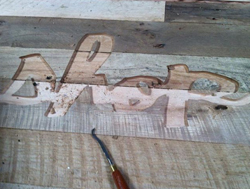Expert CNC cutting service.
Neal's CNC is a cutting and fabrication service specializing in museum quality custom cutting of small batch or single part runs.
What we cut
Our CNC router can cut almost anything. All hard and soft woods, rubbers and foams, plastics as well as FRP's such as carbon fiber or fiberglass. Metals aren't a problem - we cut all non-ferrous metals including aluminum, brass, copper, even gold and silver. Some of the most common materials we cut are these:

- Hardwood
- Plywood
- Laminates
- Engineered wood
- HDU
- Sign board
- Gatorboard
- Acrylic/Plexiglas
- Corian
- Polycarbonate
- HDPE
- Delrin
- ABS
- PVC/Sintra
- Dibond
- Carbon Fiber
- Fiberglass
- G10
We also offer laser cutting and etching for materials such as leather, cardboard, industrial felt, cardstock, anodized aluminum, acrylic and plywood. Our waterjet partner can cut steels up to 1" thick as well as stone and (untempered) glass.
And with one of the largest cutting beds in the industry, measuring 5' x 10', we can easily cut the architectural signage for a new sports stadium, hospital, or office building.
What we fabricate
Much of our work consists of cutting the parts and building booths for the trade show, museum, and exhibition industry. We can also help you design your booth, cut and fabricate it, and at the other end, crate it up for shipping and installation. Lately we have been making parts for escape rooms, indoor golf, and virtual experience businesses.
We've made signs, architectural models, retail merchandising displays, machinery for the wine industry, and parts for the automotive industry. We've made parts for electric automobiles, last mile delivery drones, VTOL aircraft, energy storage systems, and magnetomer systems. Our work has gone into robotics systems, radiology and imaging machinery, aerospace and industrial sensors, cubesats, space startups, and the SLAC National Accelerator Laboratory. We work with civil, mechanical, space, and ocean engineers, as well as scientists, architects, teachers, designers, and artists.

fully automatic Hamburger Machine: Neal's CNC built the wooden legs


